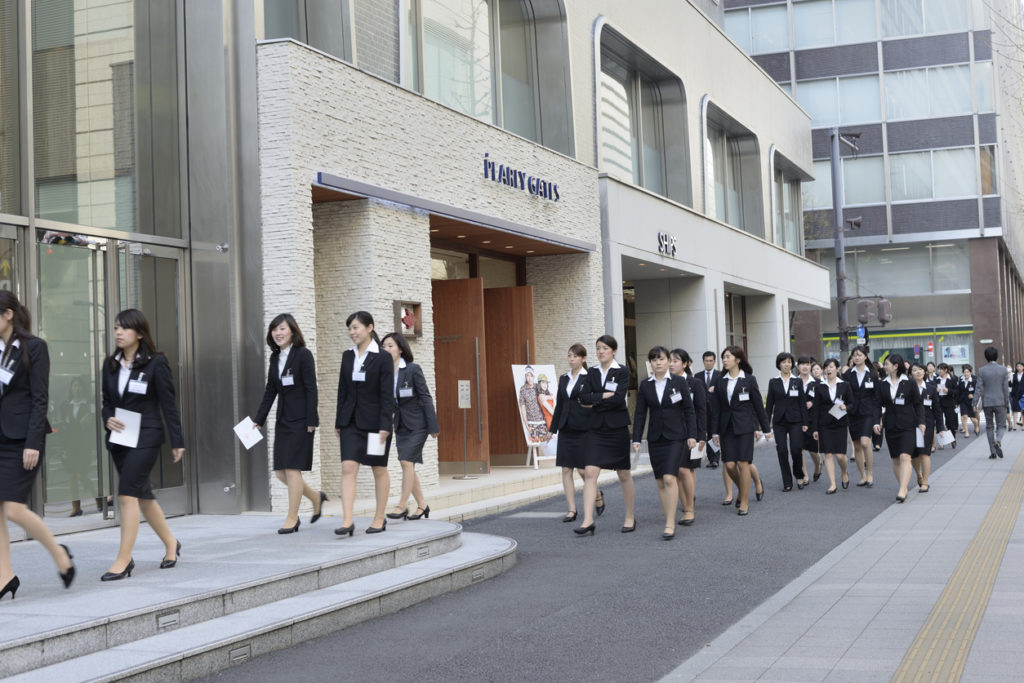It Seems There Are No Hunters Here The Hunt Will Be Resumed When Someone Treads Here Again
Looking for a job in Japan can feel similar climbing Mt. Everest — in a snowstorm, and in heels.
Looking for a task in Japan, particularly if you don't have native English education skills, can be a frustrating try. Besides the obvious issues of the language gap and physical distance (if applying from away), our own assumptions and the tendency to look at things through rose-colored glasses may brand the entire process far more complicated. And then, in order not to make the same mistakes as me, here are a few key points to continue in mind when looking for a job in Japan — which I came to learn the hard way.

#1. Existence multilingual is not a carte blanche for getting hired
Back when I was attention grad school in London and searching for jobs in Nihon, I was sure that my Japanese linguistic communication skills coupled with English would make me a shoo-in for an entry-level position. Only I was absolutely incorrect. I practical to every possible job, looked for contacts in the Japanese community in London, went to bilingual task fairs and ran afterwards every atomic number 82. It took most 2 years (and big support from all gods of luck you can name!) to finally notice a job at a small company that would have me to Tokyo.
And then, unless yous have a true calling to teach or really unique skills that are high in need, it is in general very tough to notice companies that would exist willing to hire and send a new graduate across the ocean based on language skills alone. So, instead of doing it the regular way, try something unlike—coming to Japan starting time, building connections on LinkedIn or other business groups, talking to people who've been through the procedure already and the similar.
#2. "Business concern-level Japanese" means way more than Konnichiwa
One time yous've settled downward in Japan, accept gained feel and are looking to change companies, 1 of the most important things to go on in listen is to beware of the moniker "business-level Japanese." In 99 percent of cases, this means "a perfectly bilingual person who tin can speak/write Japanese and English at a native level." Most companies volition ask for JLPT results, with JLPT2 often being considered the minimum and JLPT 1 preferable.
Most companies will inquire for JLPT results, with JLPT2 frequently being considered the minimum and JLPT 1 preferable.
I personally don't believe that a JLPT1 necessarily indicates whatsoever particular ability to fend for oneself in business organisation, but what it comes down to, really, is beingness absolutely honest with yourself virtually your level of language ability. I take interviewed many job seekers who labeled themselves as "business level" or "near-native" speakers when they could barely carry on a coherent conversation. If the position yous're applying for needs the language, you better be prepared for information technology.

#iii. Don't try to blend in—information technology'due south pointless!
When I was younger and even more foolish, I tried to play past the rules by going through the rigmarole of applications and interviews for shinsotsu (new graduates), assuming this was the correct way to continue. However, later much effort and trying to fit into the traditional mold, it finally dawned on me that working with the organization is a waste of time for non-Japanese applicants.
No matter if you write all your applications past hand in perfect calligraphy or wear one of the typical penguin suits, there's no way you lot will exist treated like a regular applicant (unless you have spent your whole life hither, in which case you will be hired instantly to provide "diversity").
New arrivals or those looking to transition from an English teaching job to some other sector will take to look for more unusual companies (such as commencement-ups, creative industries, and travel-related businesses) and well-nigh likely ignore the big names altogether, at least for a while. Await for companies that have more flexible job descriptions and already have somewhat diverse teams through more niche job portals (GaijinPot, Wantedly, and Daijob are a few good options).
#4. Choose your recruiters wisely
I was introduced to my last 2 positions by my go-to recruitment house and was quite pleased with my experiences, but at that place are a few rules for (successfully) working with recruiters. The starting time is that, unless you have very specific skills (coding, engineering, blueprint, customer service, etc.), first-time job seekers are unlikely to have much luck with recruiters, equally they are rarely asked to make full entry-level positions.
The start is that, unless you take very specific skills (coding, engineering science, design, client service, etc.), first-time chore seekers are unlikely to have much luck with recruiters, every bit they are rarely asked to fill entry-level positions.
For those with feel, it'south essential that you find an agency that specializes in what you lot are looking for, which is pretty easy cheers to Google and LinkedIn. Going with the bigger firms may seem similar the best course of action, merely in fact, a smaller recruitment visitor with strong connections in your field will have a much clearer idea of what you practise and how y'all match the jobs they are looking to fill.
Once you've established a connection with your recruiter, stay persistent and continue regular contact with them — they'll be sending yous more ideas if they know you're actively looking for a job.
#5. Potential employers will want to know EVERYTHING about you!
Specially for younger applicants, many companies will feel it's necessary to not simply review your work and college history but even your high schoolhouse and sometimes even middle school career! Questions almost marital condition, current or foreseeable children, what your parents retrieve of you being in Japan (even once yous are well out of your early on 20s) are all off-white game in the Japanese job-hunting procedure, and every bit much as it may be disruptive for many foreigners, it'southward normal in Japan.
Questions most marital condition, current or foreseeable children, what your parents recall of you being in Japan (even once you are well out of your early 20s) are all off-white game in the Japanese job-hunting procedure, and every bit much as it may be confusing for many foreigners, it's normal in Japan.
Answer the questions y'all're comfortable answering and brush off such y'all don't want to by making use of so desune (that's correct) or sukoshi chigaimasu (not exactly correct) — with your all-time smiling e'er. You'll have to be ready for a lot of explanations if you accept something "odd" on your resume, such as having attended several dissimilar schools, gotten a Master's or taken a scholastic or career gap.
In Japan everything is linear and there are no gaps between instruction and work years for most people, then if your employers see something that doesn't fit their "life ladder," they will go dislocated. Just no worries, once more, smile and politely say what made you do what y'all've washed—and don't forget to mention that dorsum home this is normal!
#six. Be a critical judge of the visitor you lot're applying for
Although the feeling of panic that comes from looking for a task and not getting anywhere is understandable (we've all been there), consider this a universal truth: if a company is treating you like dirt during the interview process, it's unlikely to get whatever improve afterward y'all are hired. If they show interest in you but because you're a foreigner, it may hateful that they're simply looking for someone to right their printing releases and emails in English.
Seek companies that are flexible and open to you in all your foreignness. In my honest personal opinion, it may exist wise to avoid the more traditional shosha (trading companies) or other long-standing mammoths of the Japanese economic system, because things are still very onetime schoolhouse there (including the morn group exercises). Although some local companies are loosening upwardly, foreign-run companies, tourism-related businesses, online services, and startups are probable to be more than open up to "unusual" candidates — which nigh of us are.
Although some local companies are loosening up, foreign-run companies, tourism-related businesses, online services, and startups are likely to exist more open up to "unusual" candidates — which most of united states are.
Also, every bit much as possible, make certain you visit the office after viii p.m. to check how many people are notwithstanding there — y'all'll give thanks yourself afterwards.
You can find more articles on working in Japan here.
What experiences take you had when job hunting in Nippon? Leave any unique stories, tips or communication in the comments!
Source: https://savvytokyo.com/6-things-wish-someone-told-job-hunting-japan/

0 Response to "It Seems There Are No Hunters Here The Hunt Will Be Resumed When Someone Treads Here Again"
Post a Comment